Opening Message from Renee: Finding a Friend
Every September, as we start the engines and gear up for “back to school,” I am reminded that this is not just a return to routines or the rhythms of the season. It is a chance to begin again. We get a chance to reset the environment, rethink routines and establish relationships. Most importantly, our children get a chance to discover more of who they are becoming, and we – their parents and teachers – get another chance to walk alongside them in that discovery. At Greenhouse, we know that strong, supportive relationships provide the foundation for this journey. From the youngest age, human beings seek out others. Babies return a smile; toddlers squeal with delight while playing peek-a-boo; preschoolers offer a tissue to a fellow traveler having big feelings. From the start we are wired to connect with others. Relationships, including the relationship between children, parents and teachers provide the conditions in which all of our school experiences and learning take place. When people think about “school learning”, they often picture letters and numbers, books and pencils. But learning how to make and keep a friend is just as complex – and just as important – as learning how to read or count. This is why social emotional learning and relationships are fundamental to our work at Greenhouse.
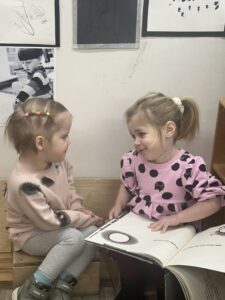
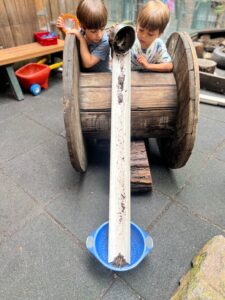
The Role of the Teacher: A First Relationship
The key to social learning in school starts with a trusting relationship with the teacher. In order for our children to be able to fully explore and experience the social and learning world that is available at school, they first need to develop a secure and warm attachment with the adults in the room. The teacher-child relationship is the anchor to all learning. We know (and research supports) that young children learn best when they are in warm, trusting relationships with their teachers. It is why we begin the school year with such intention. The meet-ups, class visits and phase-in schedule give each child time and experience to begin to build their relationships with the grown-ups in their class. With each simple interaction or visit, your children learn that these adults called teachers are trustworthy. Conversely, the teachers learn each child’s unique point of view, interest and dispositions. We learn who loves unicorns, who needs a little space and who needs a warm lap! Every child brings their own story to school, and we are here to listen. From this strongly connected child-teacher relationship, we are able to guide each child’s unique social learning and growth.
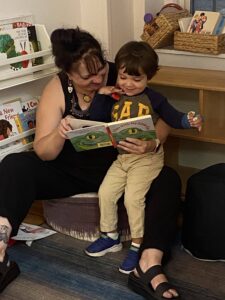
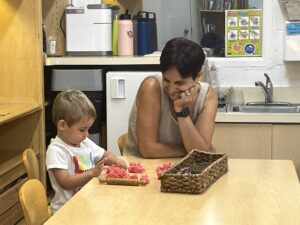
Language of Emotions
The language of feelings is key to learning about the social emotional world. We teach children that all feelings are okay and welcomed at school, even the big (sometimes messy!) ones. Consistently offering children support, warmth and empathy – especially when they are experiencing big emotions – allows children to feel more secure at school. We help children build their social emotional vocabulary so they can recognize what’s happening inside and around them and practice naming it:
“Are you sad that your friend is playing with someone else right now?’
“Are you feeling frustrated that your friend didn’t listen to your idea?’
“You really wanted a turn on that tricycle.”
“Are you feeling crowded? Tell your friend your body needs more space.”
Naming feelings helps children process them. It brings big emotions into the realm of language and thought, and away from impulse and reaction. This development and skill is the foundation of self-regulation and it’s foundational to forming healthy relationships with others.
Designing and Planning for Social Interaction
Play provides the perfect context for social learning. Our environment, materials and curriculum model all are designed to invite connection, collaboration and bring children together. Materials are intentionally chosen to spark imagination and shared thinking. Projects and shared work provide a common goal that bring us closer together. Snack and lunch time provide us the perfect opportunity for sharing stories and connection. We work to build a sense of community and connection across all the children in each class.
As children engage together in play, they are practicing the very pro-social behaviors they need to be successful in relationships. Our young children are just at the beginning of this learning. “Getting along” with others is not always easy (even for adults!). It takes practice and play provides the perfect context for that learning. While playing, children take turns, make decisions, lead and follow; they express their needs and hear the needs of others. They learn how to enter into and contribute to play, “That’s a cool building. I’m going to build one too.” Whether they are building the Empire State Building or setting the table for dinner, play is where social learning comes to life for young children. And our highly trained and experienced Greenhouse teachers are right there beside them to facilitate and nurture that growth for each individual child.
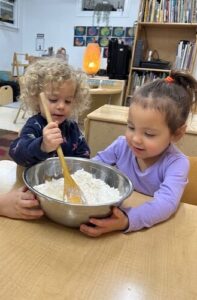
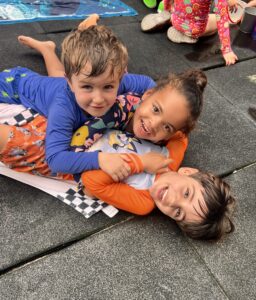
Unique experiences and points of view
Children’s social competence and ability to build relationships with their peers truly grows when their differences and sameness are celebrated. Whether we are talking about differences of race, language, gender, family composition or ability these parts of our identity make social relationships more authentic, interesting and dynamic. All children benefit from being in a social group that recognizes that we have our own unique identities, experiences, abilities and potential for growth. When we normalize these aspects of our identities we create a world where all children get to experience being seen, valued and honored at school.
We spend time learning about each individual child’s experience, identity, temperament and point of view. Some children are eager and outgoing, always ready to join in. Others prefer to observe first, taking their time before they connect. Some are eager to share their ideas; others are quiet contributors. Some love a lively, loud, raucous group play; others prefer quiet partner play. It is vital to remember there is not one right way to be in the world! There is not one right way to make a friend or be a friend. The world requires many different ways of being. Our kids need us to see them for who they are and support them on their journey of becoming.
Conflict is a Learning Opportunity
Friends can be the impetus for fun, laughter and joy. Friends can also be the catalysts for sadness, tears and loss. Relationships are work. Disagreements happen. Hurt feelings arise. Friendships shift and change. Helping our children understand the social world means helping them understand all parts of that world. Not just the happy, warm fuzzy parts. Leaning into those moments of discomfort with support, warmth and empathy will go a long way in helping our children build resiliency, flexibility and confidence in their own ability to handle whatever comes next. The conflict resolution model provides an effective framework for problem solving. We help children identify the problem and then help them look for solutions. Figuring out how to share materials, space and ideas becomes routine and second nature in an early childhood classroom. As children grow, their social world also grows and it becomes more complex.
Under the age of four, young children’s understanding of friends is very pragmatic. “You are sitting next to me at lunch, you are my friend.” Or, “we both like Paw Patrol, you are my friend.” As children move into their fourth year and beyond, their social understanding becomes more complex and they begin to develop a natural curiosity about belonging, influence and power. “Are you still my friend if we don’t sit next to each other at meeting? Or if you make a plan to play with another friend in the big yard?” Clear and strong preferences start to appear. Power dynamics are explored, “We are having a play date after school. You can’t come!” These flexes are examples of young children testing their social roles and power – sometimes clumsily, sometimes with intent. At Greenhouse, we understand that these are signs that children are becoming aware of their impact on others. We treat these moments as important opportunities for deep learning. We step in and guide conversations to help our kids reflect on their choices, consider others’ perspectives and understand the emotional impact they have on other people. It is vital to remember that our kids are just at the beginning of this learning. There will be days that they get it right and there will be days they get it very wrong. That’s learning! Our long-term goal is to help our children begin to internalize values of fairness, kindness, and equity – laying the foundation for respectful, healthy relationships in childhood and beyond.
First Friends
As adults, many of us can still remember our very first friend. We remember what it felt like to be included and connected to someone outside of our family. We may also remember the hurt of being excluded or the loss of a friendship that ended. As we look at our young children and realize these complex experiences are lying in wait, it is completely natural to want to protect them from this pain. But instead of jumping in to fix the problem for them or shielding them from developmentally appropriate struggles, we will walk beside them. With an open heart and a mindful ear, our teachers will listen, empathize, facilitate, and hold clear, warm boundaries as your children move through their social world. Our kids will learn that they can get through tough times; they are capable, strong, and not alone. This is how they will build the confidence, resilience, and skills to handle the social world in school and beyond.
The chance to begin again is here and I look forward to walking beside you and your child as we discover all there is to discover at Greenhouse in the year ahead.
Renee